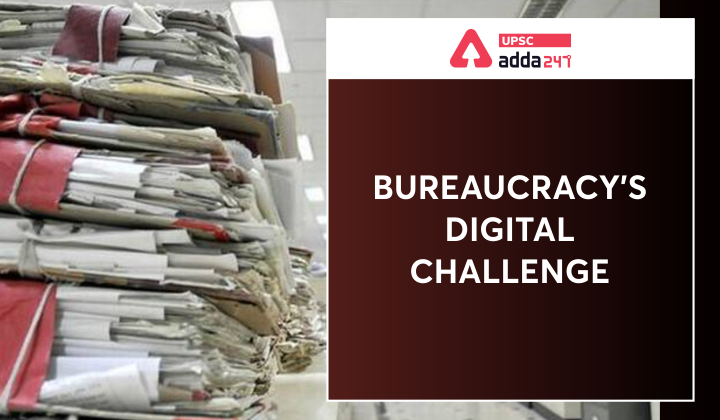Table of Contents
Bureaucracy’s digital challenge- Relevance for UPSC Exam
- GS Paper 2: Important aspects of governance- Transparency and accountability
- e-governance- applications, models, successes, limitations, and potential.
Bureaucracy’s digital challenge- Context
- If civil servants don’t use social media appropriately, their role as independent advisers stands threatened.
Indian Bureaucracy- Shift from Desk to Digital
- This shift is in multiple areas like transition towards e-office and e-governance.
- Unaddressed Areas: The shift in organizational and bureaucratic response to digital spaces, especially the use of social media has largely been unaddressed.
Revitalising PM-KUSUM- Key Features, Implementational Challenges and Way Forward
Issue of using Social Media by Civil Servants
- Many support the use of social media by civil servants in their official capacity while many argue that anonymity, the defining feature of Indian bureaucracy, gets compromised in the process.
- Social Media vs Bureaucracy: Bothe are incompatible with each other.
- While bureaucracy is characterized by hierarchy, formal relationships and standard procedures, social media is identified by openness, transparency and flexibility.
- Use of social media for self-promotion: Social media is getting used by civil servants for self-promotion and justifies that in the name of accessibility and accountability.
- But it’s not the right way to ensure accountability and accessibility as civil servants are at an advantage to share the information they want and respond to those they want.
- It is not a formal set up where accessibility and accountability are based on uniformity of treatment.
- Issue with Anonymity and opaqueness: Anonymity and opaqueness have already been watered down through the Right to Information Act of 2005. But they continue to be prominent features.
- In the era of public governance, there is no sense for the bureaucracy to be habitually anonymous.
FASTER system of Supreme Court
Positives of social media on governance
- Increased Accessibility: many civil servants have become accessible to the common people and public service delivery issues have been resolved through the use of social media.
- Builds trust and promotes openness: social media has also created a positive outlook towards an institution long perceived as opaque and inaccessible.
- Social media has increased awareness among people about government policies and programs.
- Social media provides an opportunity for bureaucrats to shape the public discourse and engage with the public while being politically neutral.
FSSAI’s State Food Safety Index 2021
Bureaucracy and Social Media- Way Forward
- Bureaucracy as the epitome of public values and a storehouse of facts: shouldn’t be expected to govern in private, especially when both values and facts are getting reshaped due to fake news and systematic propaganda within public policy circles as well.
- Institutionalize the use of Social Media: as being done in many Westminster system-based countries.
- For instance, during the Brexit debate in the U.K., many civil servants shaped public debate through the use of social media even while remaining politically neutral.
- Social media accountability is no alternative to institutional and citizen-centric accountability: It is, in fact, partly unethical to use social media during office hours and justify it when some people who have traveled long distances are waiting outside the office.
Global Manufacturing Risk Index
Conclusion
- Bureaucrats should use social media to improve public policies. If they don’t use social media appropriately, their role as independent advisers stands threatened.
Social and Emotional Learning- Empathy Through Education




 TSPSC Group 1 Question Paper 2024, Downl...
TSPSC Group 1 Question Paper 2024, Downl...
 TSPSC Group 1 Answer key 2024 Out, Downl...
TSPSC Group 1 Answer key 2024 Out, Downl...
 UPSC Prelims 2024 Question Paper, Downlo...
UPSC Prelims 2024 Question Paper, Downlo...





